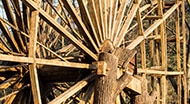“Freeman’s Mill is a historic site that helped bring the tools of industry to Gwinnett,” said District 3 Commissioner Tommy Hunter. “While the mill is currently not open to the public, when it’s finished, this project will let visitors experience what life was like for a miller dealing in goods and services in a rural community. They’ll also be able to understand the mill’s role in the economic growth of Georgia in the late 1800s, and see how it operated using simple machines, energy, gravity, force and hydrology.”
The project, funded by the 2009 SPLOST, consists of site improvement, and restoration, and renovation of the mill building, including selective demolition, an ADA ramp, interior construction, structural renovations, landscaping, concrete and paver sidewalks, and construction of a building to house new fire protection equipment.
Lefko Development, Inc. was the lowest of six bidders with a bid of $406,052. Construction is expected to be finished early next year.
The mill used water from streams to turn a waterwheel, which cranked series of gears, which turned massive, precisely cut stones one on top of the other. The millstones, which could weigh up to 2 tons each, could be adjusted so finely that they ground wheat into flour and corn kernels into cornmeal.
Ultimately, the mill will house interior and exterior exhibits that provide visitors with an interactive, immersive experience that will help bring the history of the site and related scientific concepts to life.
Exhibits inside the mill will include life-sized dioramas, archival video, interpretive signs, and artifact displays. A nearby shed will include interactive exhibits, such as a gear wall, block and tackle, and a reproduction grain elevator, a seed-to-table diorama, and an electric mill where guided visitors can grind their own souvenir bag of meal.
The historic mill will be available for self-guided tours, festivals, school field trips, camps, special events and heritage tourism. School programming and camps will focus on the importance the mill to farmers and the local economy, history, its role in the community, and the technology of the day.
Freeman’s Mill was built on the Alcovy River between 1868 and 1879 by brothers John Griffin and Levi J. Loveless and was one of 1,262 water-powered mills in the state at that time. By 1996, it was the only working mill in Gwinnett County and reportedly one of 15 in the state. The County bought the mill in 2001, and in 2009 restored the mill and surrounding 12 acres for education and recreational use.
Freeman’s Mill Park is located at 1401 Alcovy Road, Lawrenceville.


